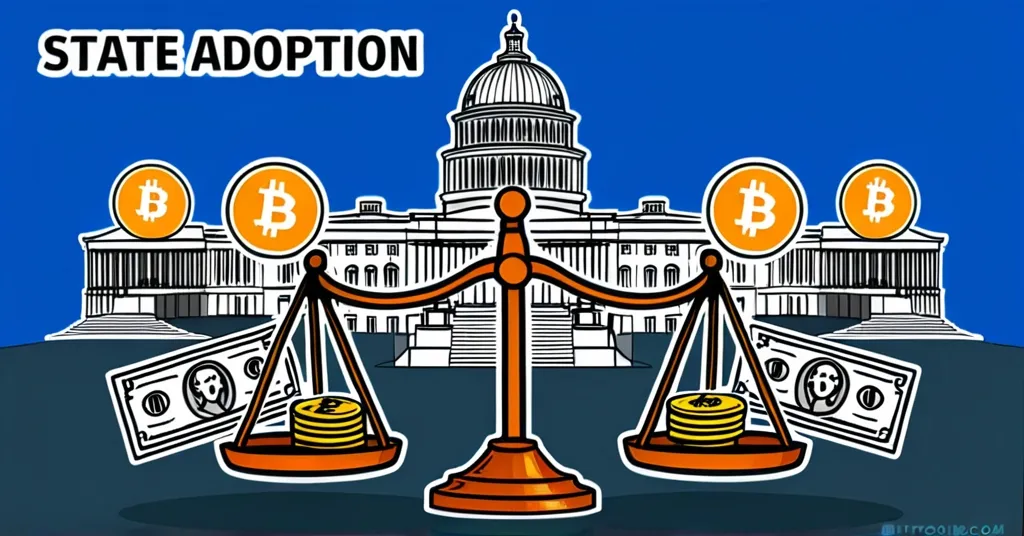24 U.S. States Eye $23.7B Bitcoin Reserves: A New Era in Public Finance

The Growing List of U.S. States Embracing Bitcoin Reserves
Nearly two dozen U.S. states are exploring the potential of Bitcoin reserves as a strategic investment, signaling a shift in public finance management.
- Nearly two dozen U.S. states exploring Bitcoin reserve legislation
- Potential for collective acquisition of 247,000 BTC, valued at $23.7 billion
- States see Bitcoin as an inflation hedge, diversification tool, and high-growth asset
Across the United States, a bold new trend is emerging as state governments dive headfirst into the world of cryptocurrency. Nearly two dozen states are actively considering legislation to establish Bitcoin reserves, with an eye on acquiring a collective 247,000 BTC, worth a staggering $23.7 billion. This move is driven by the potential of Bitcoin to serve as an inflation hedge, a means of diversifying investment portfolios, and an asset with significant growth prospects. From Alabama to Wyoming, state officials are signaling a shift in how public funds are managed and invested.
Alabama’s State Auditor Andrew Sorell is vocal about the future of digital currencies.
“Crypto is here to stay. Nearly 500 million people worldwide own cryptocurrency. The debate over whether crypto will succeed has ended. Now, the fight for which states will benefit from it has begun.”
This perspective reflects a broader recognition of cryptocurrency’s permanence and potential within state financial strategies.
In Arizona, the Senate Finance Committee has taken a significant step by approving the “Arizona Strategic Bitcoin Reserve Act.” This act would permit the allocation of up to 10% of public funds into Bitcoin and other digital assets, demonstrating a commitment to integrating cryptocurrencies into the state’s financial framework.
Florida’s CFO Jimmy Patronis is also exploring the potential of Bitcoin investment for the state. He has requested a feasibility study to assess the risks and benefits of directing a portion of the state’s retirement system funds into Bitcoin.
“When managing state pensions for firefighters, teachers, and police officers, it’s also essential to prioritize the bottom line and ensure the best return on investment for Floridians. This is where the potential of investing in a cryptocurrency, like Bitcoin, becomes particularly compelling.”
Kansas is considering legislation that would allow the Kansas Public Employees Retirement System to invest up to 10% of its assets in Bitcoin ETFs (Exchange-Traded Funds), which allow investors to gain exposure to Bitcoin without directly owning the cryptocurrency. Similarly, Illinois has introduced the Bitcoin Strategic Bill, aiming to establish Bitcoin as a strategic asset for the state.
Michigan’s State Retirement System has already ventured into Bitcoin investment, disclosing ownership of shares in a Bitcoin ETF. Meanwhile, Missouri and several other states are introducing bills to establish Bitcoin reserves and protect miners’ rights, indicating a comprehensive approach to embracing cryptocurrency.
Wisconsin has made history by becoming the first U.S. state to purchase Bitcoin ETFs, holding shares valued at approximately $321 million as of December 31. Wyoming is also in the game, considering the allocation of up to 3% of state funds into Bitcoin through secure custody solutions (services that safely store digital assets), registered custodians, or exchange-traded products.
The trend extends to states like Montana, New Hampshire, New Jersey, New Mexico, North Carolina, North Dakota, Ohio, Pennsylvania, South Dakota, Texas, and Utah. Each state is exploring unique avenues to incorporate Bitcoin into their financial strategies, from investing state funds to protecting the rights of Bitcoin miners. Utah’s digital asset taskforce, led by Dennis Porter of the Satoshi Act Fund, has been particularly active.
“Every single bill that has come out of that taskforce has ultimately passed into law over the last several years, and our strategic Bitcoin reserve legislation just passed out of that taskforce.”
This wave of state-level interest in Bitcoin reserves aligns with a broader global movement toward recognizing cryptocurrencies as legitimate financial assets. Historically viewed with skepticism by traditional financial institutions, Bitcoin’s perceived benefits as an inflation hedge and a diversification tool are driving increased acceptance. However, it’s crucial to approach this trend with a balanced perspective. Bitcoin’s volatility can be a double-edged sword, offering high returns but also significant risks. States must carefully navigate these factors when integrating Bitcoin into their investment strategies. Additionally, while Bitcoin has shown potential as an inflation hedge, it is not a safe haven like gold, according to research from “Bitcoin: An Inflation Hedge but Not a Safe Haven.”
For those new to cryptocurrency, Bitcoin is a decentralized digital currency that operates on a blockchain, a distributed ledger technology. Digital assets encompass a range of cryptocurrencies and tokens, while Bitcoin ETFs provide a way to invest in Bitcoin without directly holding the cryptocurrency. Secure custody solutions ensure the safe storage of digital assets.
As a champion of decentralization and financial freedom, Bitcoin maximalists see these state initiatives as steps toward a broader adoption of Bitcoin’s mission. However, it’s essential to acknowledge the role of altcoins and other blockchains like Ethereum, which also contribute to the financial revolution by filling niches that Bitcoin does not serve. These technologies offer unique functionalities and applications, enriching the crypto ecosystem.
Playing devil’s advocate, some might argue that state investment in Bitcoin is akin to gambling with public funds. Critics point to Bitcoin’s volatility and the potential for significant losses. Additionally, regulatory hurdles and environmental concerns related to Bitcoin mining could pose challenges to the long-term viability of these initiatives. Yet, the potential for high returns and the strategic importance of diversifying state investments cannot be ignored.
Looking forward, the impact of these state initiatives on the future of Bitcoin and blockchain technology in the U.S. remains to be seen. If successful, they could set a precedent for other regions and countries, further legitimizing cryptocurrencies in public finance management. As this trend unfolds, it will be crucial to monitor how states navigate the opportunities and challenges of integrating Bitcoin into their investment strategies.
Key Questions and Takeaways
- What is the total estimated value of Bitcoin that could be acquired by the states mentioned?
Approximately $23.7 billion, based on the potential acquisition of 247,000 BTC.
- Why are U.S. states interested in establishing Bitcoin reserves?
States see Bitcoin as an inflation hedge, a means of diversification, and an asset with potential for high returns.
- Which state was the first to buy Bitcoin ETFs?
Wisconsin was the first U.S. state to buy Bitcoin ETFs.
- What is the current status of the Arizona Strategic Bitcoin Reserve Act?
The Arizona Senate Finance Committee approved it, and it is moving to the Senate Rules Committee for debate and amendments.
- What percentage of its assets is Kansas considering investing in Bitcoin ETFs?
Kansas is considering allowing up to 10% of the Kansas Public Employees Retirement System’s assets to be invested in Bitcoin ETFs.
- What did Florida CFO Jimmy Patronis request regarding Bitcoin investments?
He requested a report on the feasibility, risk, and potential benefits of directing a portion of state retirement system monies into cryptocurrency.
- What is the role of the Utah digital asset taskforce?
The taskforce is dedicated to voting on bills related to crypto and web3, with all of its bills passing into law over recent years.
- What is the predicted Bitcoin price target by Galaxy Digital’s head of research Alex Thorn?
Alex Thorn predicted that Bitcoin could reach $185,000 by the end of 2025.
- How is Wyoming planning to invest in Bitcoin?
Wyoming is considering allowing up to 3% of state funds to be invested in Bitcoin through secure custody solutions, registered custodians, or exchange-traded products.
- What is the current legislative progress in Texas regarding Bitcoin?
Texas is proposing Senate Bill 778 to create a Bitcoin reserve separate from the state’s general revenue fund, with plans to collect taxes and donations in cryptocurrency and a five-year embargo on selling state bitcoins.
This trend of U.S. states embracing Bitcoin reserves is a testament to the growing recognition of Bitcoin’s potential as a strategic asset. It raises important questions about the future of public finance and the role of digital currencies in our economy. As states continue to navigate this new frontier, the balance between opportunity and risk will be crucial to watch.



